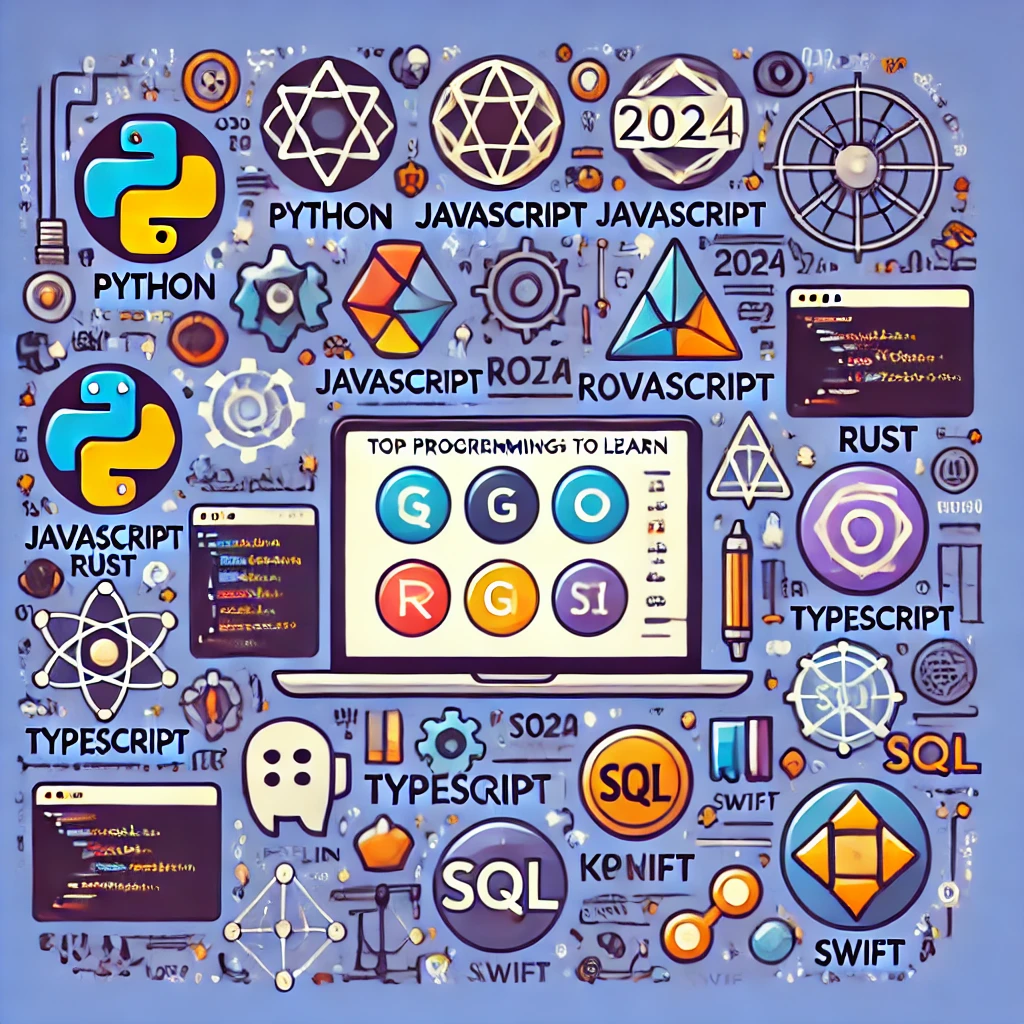Top Programming Languages to Learn in 2024

As technology continues to evolve rapidly, the demand for skilled developers is only increasing. For anyone looking to build a career in software development or advance in the tech industry, learning the right programming languages is essential. While some languages are staples in the industry, new languages and frameworks are constantly emerging, offering better efficiency, scalability, and functionality.
In 2024, several programming languages stand out due to their versatility, growing demand, and application across various industries such as artificial intelligence (AI), web development, mobile app development, and more. This article will explore the top programming languages to learn in 2024 and why they are worth considering for aspiring and experienced developers alike.
1. Python
Why Learn Python?
Python has maintained its position as one of the most popular and beginner-friendly programming languages due to its simplicity, readability, and versatility. It’s widely used in web development, automation, AI, data science, and machine learning (ML), making it a must-learn language for aspiring developers. Python’s rich ecosystem of libraries and frameworks—such as Django, Flask, NumPy, and TensorFlow—makes it an excellent choice for a wide range of applications.
Key Applications:
- Web Development: Frameworks like Django and Flask allow developers to build scalable web applications efficiently.
- Data Science and Machine Learning: Libraries like Pandas, NumPy, Scikit-learn, and TensorFlow make Python the go-to language for data analysis and machine learning.
- Automation and Scripting: Python’s simplicity makes it ideal for writing automation scripts, which are widely used in IT and DevOps.
Growing Demand:
Python’s dominance in AI and machine learning continues to grow, driven by the increased use of data-driven applications. Companies like Google, Facebook, and Microsoft heavily rely on Python for their AI and data science projects, making it a high-demand skill in 2024.
2. JavaScript
Why Learn JavaScript?
JavaScript is the backbone of modern web development. It is the most commonly used language for creating dynamic and interactive web pages. Given that it runs natively in browsers, JavaScript is essential for frontend development, but it has expanded to backend development through environments like Node.js.
Key Applications:
- Frontend Development: JavaScript, along with HTML and CSS, forms the foundation for creating interactive and responsive websites. Frameworks like React, Angular, and Vue.js dominate the frontend landscape.
- Backend Development: With the advent of Node.js, JavaScript has become a popular choice for server-side programming, allowing developers to use the same language for both frontend and backend development.
- Mobile App Development: Frameworks like React Native and Ionic enable developers to build cross-platform mobile applications using JavaScript.
Growing Demand:
JavaScript is indispensable in the web development space, and with the increasing complexity of web applications and the demand for mobile and desktop apps, JavaScript is a critical skill for developers in 2024.
3. Rust
Why Learn Rust?
Rust is gaining a reputation as one of the most loved and efficient programming languages, particularly for system-level programming. Rust is designed for performance and safety, with a particular focus on memory safety without using garbage collection, which makes it a favorite for building fast and reliable software.
Key Applications:
- Systems Programming: Rust is an excellent choice for writing operating systems, game engines, and other performance-critical applications.
- WebAssembly: Rust can compile into WebAssembly, making it a powerful tool for running high-performance applications in browsers.
- Blockchain: Rust is being used in the development of blockchain projects such as Polkadot and Solana, which prioritize performance and security.
Growing Demand:
With the growing need for high-performance applications and Rust’s emphasis on safe and efficient memory management, it’s becoming a go-to language for system developers, blockchain projects, and those focused on security and performance.
4. Go (Golang)
Why Learn Go?
Go, often referred to as Golang, was developed by Google and is known for its simplicity, efficiency, and scalability. It has gained immense popularity for cloud-native applications, distributed systems, and microservices architecture due to its concurrency support and ease of use.
Key Applications:
- Cloud Computing: Go is widely used in cloud platforms and services such as Kubernetes, Docker, and Prometheus.
- Microservices: The language’s simplicity and efficiency make it ideal for building scalable microservices architectures.
- Web Development: Go’s fast execution and lightweight nature make it a good choice for building high-performance web applications.
Growing Demand:
As cloud computing and microservices architecture become increasingly popular, Go’s ability to handle large-scale, concurrent operations efficiently makes it a key language to learn in 2024. Its use in platforms like Kubernetes and Docker further solidifies its importance in DevOps and cloud engineering.
5. Kotlin
Why Learn Kotlin?
Kotlin has become the preferred language for Android app development, overtaking Java in many respects. Developed by JetBrains, Kotlin is fully interoperable with Java and provides more concise and modern syntax, making it easier and more efficient to work with.
Key Applications:
- Android Development: Kotlin is now the official language for Android app development, supported by Google.
- Cross-Platform Development: Kotlin Multiplatform allows developers to use the same codebase for Android and iOS apps.
- Web Development: Kotlin can also be used for server-side development with frameworks like Ktor.
Growing Demand:
With Android dominating the mobile OS market, Kotlin is in high demand for mobile app development. Additionally, its versatility and ability to be used for backend and cross-platform development make it a strong choice for developers in 2024.
6. TypeScript
Why Learn TypeScript?
TypeScript is a superset of JavaScript that adds static typing, which helps developers catch errors early during the development process. It has gained significant traction among developers due to its ability to scale large applications more effectively and provide better tooling support.
Key Applications:
- Web Development: TypeScript is commonly used in conjunction with JavaScript frameworks like Angular, React, and Vue.js to build more maintainable and scalable web applications.
- Backend Development: With Node.js, TypeScript can be used for building server-side applications.
- Large-Scale Applications: TypeScript’s strong typing system makes it ideal for large codebases where maintainability and refactoring are key concerns.
Growing Demand:
As web applications grow more complex, TypeScript is increasingly being adopted for large-scale projects to improve code quality and maintainability. Many major companies, including Microsoft, Slack, and Airbnb, rely on TypeScript, making it a crucial language for web developers in 2024.
7. Swift
Why Learn Swift?
Swift, developed by Apple, is the go-to language for iOS app development. Known for its speed and ease of use, Swift has quickly become a favorite for building iOS, macOS, watchOS, and tvOS applications. It is designed to be safe, fast, and expressive, making it a powerful tool for mobile development.
Key Applications:
- iOS Development: Swift is the primary language for developing iOS applications.
- Cross-Platform Development: With frameworks like SwiftUI and Vapor, developers can use Swift for cross-platform and server-side development.
Growing Demand:
The Apple ecosystem continues to be a lucrative market, with iOS developers in high demand. If you’re looking to develop apps for iPhones, iPads, or MacBooks, learning Swift in 2024 is essential.
8. SQL (Structured Query Language)
Why Learn SQL?
While not a traditional programming language, SQL remains essential for database management and manipulation. Almost every application interacts with a database, and SQL is the standard language for querying and managing relational databases.
Key Applications:
- Database Management: SQL is used for managing and querying data in relational databases like MySQL, PostgreSQL, and SQL Server.
- Data Analytics: SQL is crucial for extracting and analyzing data, making it indispensable for data scientists and analysts.
- Backend Development: SQL is widely used in backend development to manage database operations efficiently.
Growing Demand:
As data becomes increasingly central to business operations, SQL remains a vital skill for developers, data analysts, and data engineers. Knowledge of SQL is required across many roles, making it a fundamental tool for 2024.
Conclusion
In 2024, the demand for versatile and efficient programming languages will continue to grow. Python, JavaScript, Rust, Go, Kotlin, TypeScript, Swift, and SQL are among the top languages to learn, each offering unique strengths for various applications, from web and mobile development to cloud computing, AI, and data science. Whether you’re just starting your programming journey or looking to advance your skills, learning these languages will open up numerous opportunities and help you stay competitive in the ever-evolving tech industry.





